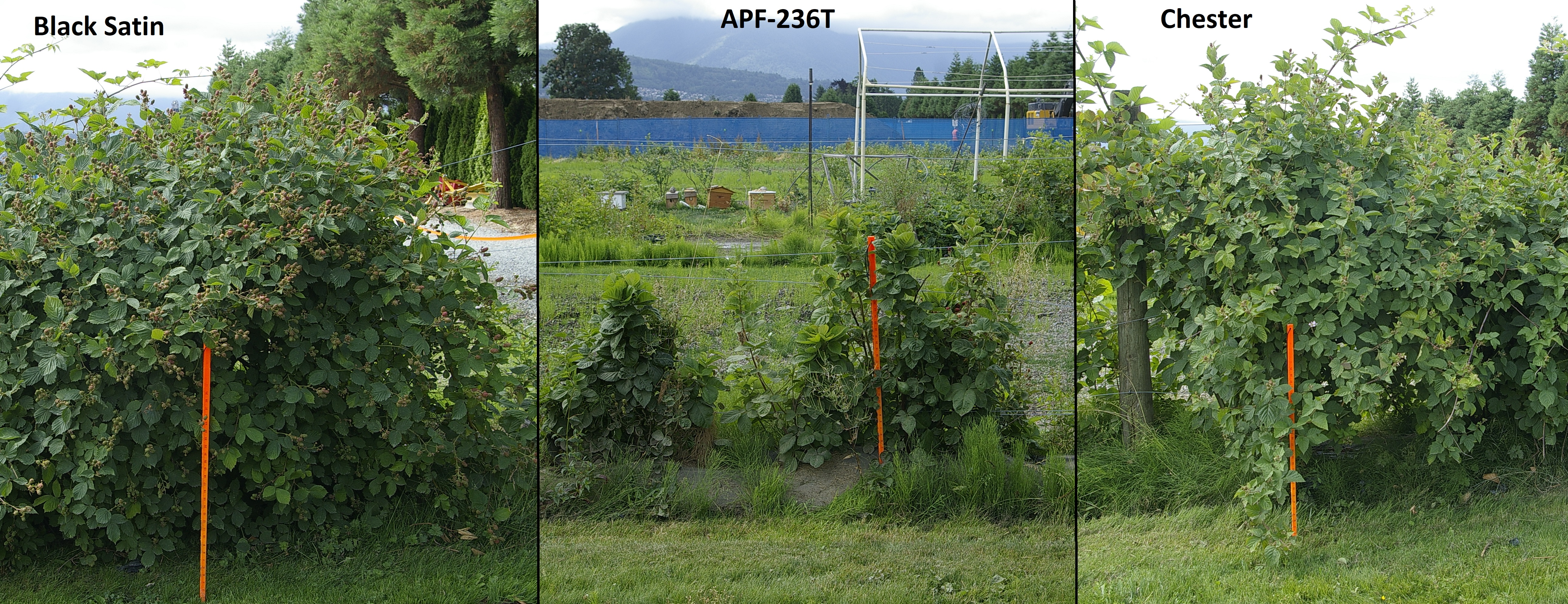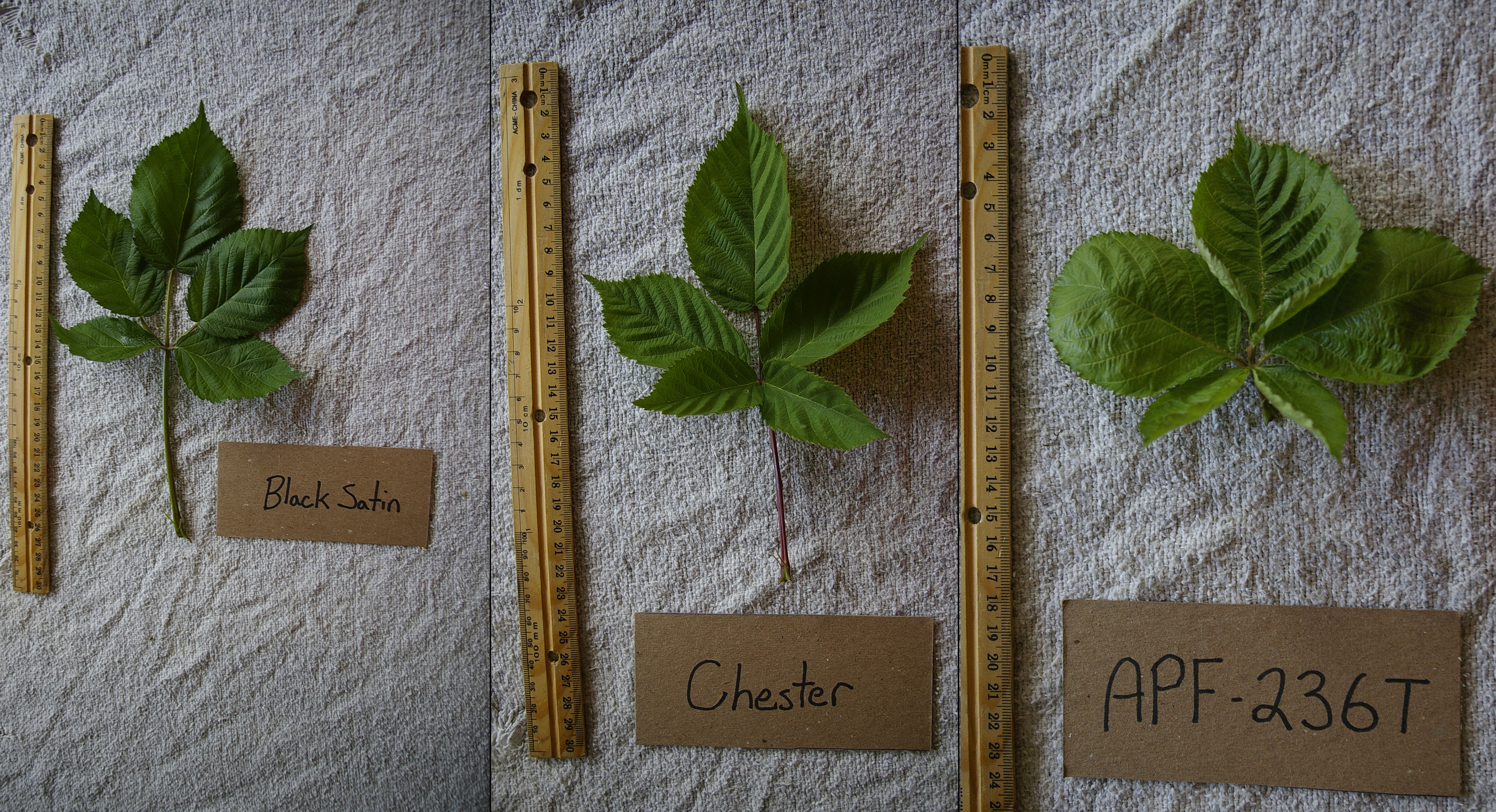APF-236T
| Denomination: | 'APF-236T' |
|---|---|
| Trade name: | Sweetie Pie |
| Botanical Name: | Rubus |
| Applicant/Holder: |
The Conard-Pyle Company 8 Federal Road, Suit 6 West Grove, Pennsylvania 19390 United States of America |
| Breeder: |
Peter Stefan Boches, Fall Creek Farm and Nursery Inc., Eugene, United States of America John Reuben Clark, University of Arkansas, Fayetteville, United States of America |
| Agent in Canada: |
Expert Agriculture Team Ltd. 46420 Prairie Central Road Chilliwack, British Columbia V2P 6H3 Canada Tel: 604-795-2537 |
| Application Date: | 2015-06-30 |
| Provisional Protection:: | 2015-06-30 |
| Application Number: | 15-8678 |
| Grant of Rights Date: | 2019-09-04 |
| Certificate Number: | 6059 |
| Grant of Rights Termination Date: | 2039-09-04 |
Variety Description
Varieties used for comparison: 'Chester' and 'Black Satin'
Summary: The plants of 'APF-236T' have an upright growth habit while the plants of 'Chester' and 'Black Satin' have a semi-upright to spreading growth habit. The dormant canes of 'APF-236T' are shorter and have a smaller diameter than those of the reference varieties. The terminal leaf of 'APF-236T' has a medium degree of blistering between veins, while the terminal leaf of the reference varieties have a very weak degree of blistering. The upper side of the leaf of 'APF-236T' has a strong degree of glossiness while 'Chester' has a weak to medium degree of glossiness and 'Black Satin' has a very weak to weak degree of glossiness. The fruit of 'APF-236T' is shorter than that of 'Black Satin' and narrower than that of 'Chester'. 'APF-236T' bears fruit on the current years cane while the reference varieties do not bear fruit on the current years cane. 'APF-236T' begins flowering and fruit ripening on the previous years cane early to mid-season whereas 'Chester' begins flowering and fruit ripening late in the season.
Description:
PLANT: upright growth habit, medium to many new canes, bears fruit on current and previous year`s cane, produces suckers from roots
DORMANT CANE: medium to strong intensity of anthocyanin colouration, few branches, distribution of branches predominantly on upper third, rounded to angular in cross-section
SPINES: absent
YOUNG SHOOT: very weak intensity of anthocyanin colouration during rapid growth, medium green, medium number of glandular hairs
LEAF: predominantly three leaflets per leaf, palmate type, medium to dark green on upper side, strong glossiness on upper side
PETIOLE: medium sized stipules
TERMINAL LEAFLET: lobing absent, v-shaped in cross-section, absent or very weak undulation of margin, medium degree of blistering between veins, shallow to medium depth serrated incisions of margin
FLOWERING ON PREVIOUS YEAR'S CANE: begins early to mid-season
FLOWERING ON CURRENT YEAR'S CANE: begins mid-season
PEDICEL: sparse glandular hairs
FLOWER: white
FRUIT RIPENING ON PREVIOUS YEAR'S CANE: begins early to mid-season
FRUIT RIPENING ON CURRENT YEAR'S CANE: begins mid-season
FRUIT: small to medium length to width ratio, medium ovate to elliptic shape in longitudinal section, black
DRUPLET: few per fruit, small
Origin & Breeding History: 'APF-236T' arose from the hand-pollinated cross between 'APF-120T' and 'APF-132T', conducted in 2007, near Clarksville, Arkansas, USA. From the resulting progeny, 'APF-236T' was selected in 2009 based on thornless canes, dwarf growth habit, fruit size, fruit quality and primocane flower bud formation. It was asexually propagated from root cuttings in 2009. 'APF-236T' was further evaluated in 2009 near Clarksville, Arkansas and in 2010 in Lowell, Oregon, USA.
Tests & Trials: The comparative trial for 'APF-236T' was conducted in Chilliwack, British Columbia during the 2016-2017 growing season. The plots were planted in May of 2015, in a randomized complete block design. Each variety consisted of 3 replicates per variety with 4 plants per replicate, for a total of 12 plants of each variety. Spacing was approximately 1.2 metres between plants in the row and approximately 3 metres between rows. Measured characteristics were based on a minimum of 10 measurements. The mean differences are significant at the 5% probability level based on a paired student's T-test.
Comparison tables for 'APF-236T' with reference varieties 'Chester' and 'Black Satin'
Dormant cane length (cm)
| 'APF-236T' | 'Chester' | 'Black Satin' | |
|---|---|---|---|
| mean | 84 | 278 | 332 |
| std. deviation | 19.7 | 96.7 | 104.0 |
Dormant cane diameter (cm)
| 'APF-236T' | 'Chester' | 'Black Satin' | |
|---|---|---|---|
| mean | 0.96 | 1.14 | 1.15 |
| std. deviation | 0.18 | 0.21 | 0.18 |
Fruit length (cm)
| 'APF-236T' | 'Chester' | 'Black Satin' | |
|---|---|---|---|
| mean | 2.50 | 2.56 | 2.85 |
| std. deviation | 0.34 | 0.34 | 0.36 |
Fruit width (cm)
| 'APF-236T' | 'Chester' | 'Black Satin' | |
|---|---|---|---|
| mean | 1.95 | 2.19 | 2.03 |
| std. deviation | 0.25 | 0.22 | 0.23 |
Click on image for larger view

Blackberry: 'APF-236T' (centre) with reference varieties 'Black Satin' (left) and 'Chester' (right)
Click on image for larger view

Blackberry: 'APF-236T' (right) with reference varieties 'Black Satin' (left) and 'Chester' (centre)
Click on image for larger view

Blackberry: 'APF-236T' (left) with reference varieties 'Black Satin' (centre) and 'Chester' (right)
- Date modified: